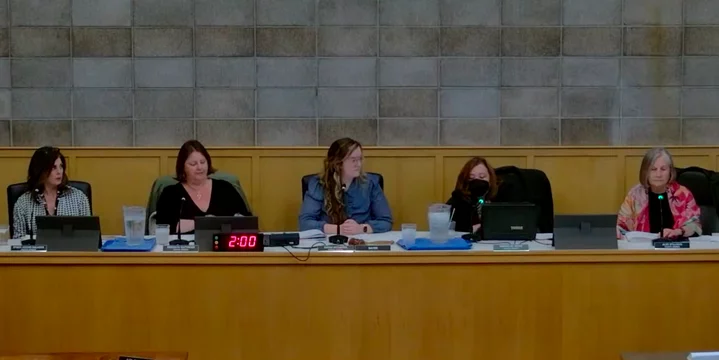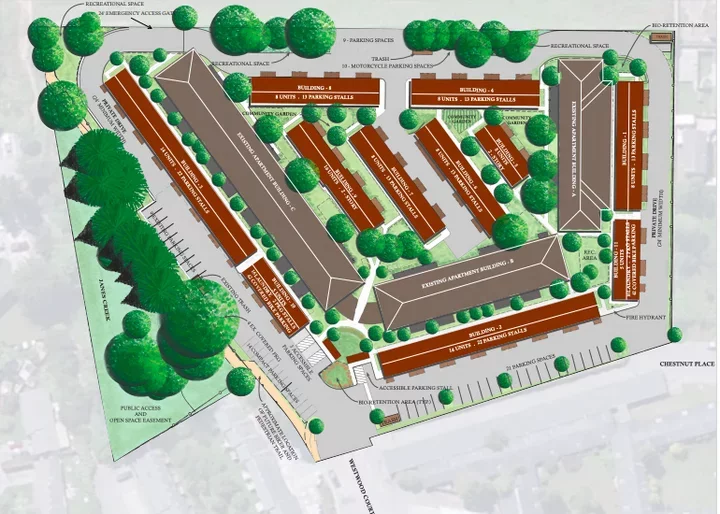Screenshot of Wednesday’s Arcata City Council meeting.
###
The Westwood Garden Apartment Project is a go.
After more than three hours of discussion on Wednesday evening, the Arcata City Council voted 4-0, with Councilmember Kimberley White recusing herself, to deny an appeal brought forth by several residents of the Westwood Garden Apartment complex and uphold the Arcata Planning Commission’s decision to approve the housing expansion project. In an effort to address some of the appellants’ concerns, the council requested that Strombeck Properties and its hired consulting firm LACO Associates include bike lockers on site and work with residents of the complex to establish an appropriate space for a community garden.
The project, which was approved by the planning commission back in October, will more than double the size of the existing 60-unit apartment complex by adding 11 new buildings that will hold 102 one-bedroom units. The plan also includes riparian enhancements to the Janes Creek/McDaniel Slough at the southern end of the parcel, as well as the removal of 21 trees (10 of which are greater than 16 inches in diameter) and the planting of 33 additional trees.
The Westwood Garden Apartment complex expansion would include 11 new buildings and a lot more trees. | Screenshot
Several residents of the complex — including recent council candidate Raelina Krikston – argued that the planning commission’s decision was based on “misleading, misrepresented, and false information” contained in the staff report.
“The qualities of the development will result in a lower quality of life for current and future residents if the development is allowed to move forward as it is currently proposed,” according to the appeal. “Instead it contributes to a degradation of the living standard on this parcel for current and future residents. Due to the nature of the project as well as inconsistencies in the staff report presented to the Planning Commission, we find the grounds for the proposed development to be appealed.”
The planning commission’s “Findings for Approval” notes that the housing expansion project would “provide important, unrestricted affordable housing for the community.” The appellants argued that “unrestricted affordable housing is a meaningless phrase” and, on top of that, “there is no affordable housing in this project,” noting that the U.S Department of Housing and Urban Development considers housing to be “affordable” when a household spends 30 percent or less of its income on housing costs.
“The commissioners referred to this project as affordable housing,” said Arcata resident Fred Weiss, who accompanied Krikston during the appellant’s presentation to the council. “The[ir] vote was made based, I believe, upon the statements … that this was supplying affordable housing for the city of Arcata. … I think that the commissioners were far more compliant about the inadequacies of the project than they would have been because we all want housing and we all want affordable housing.”
Weis and Krikston also criticized the layout of the housing plan, noting that the space between apartment buildings would limit access to sunlight within the individual units and the communal areas on site.
“I think it goes without stating … but sunlight is required for healthy living,” Krikston said. “To propose a development where community members are blocked from sunlight at the height of summer is not healthy for people. When we think of the health of the environment … we’re talking about the frogs and the trees and the grass and everything, but we’re also talking about the people who are living there, first and foremost.”
Speaking during public comment, Arcata resident Dan Duncan acknowledged the urgent need for housing in Arcata as well as the “huge pressure” placed on the planning commission to move the project forward to accommodate the anticipated influx of Cal Poly Humboldt students.
“That’s a lot of pressure,” he said. “I believe a big part of Arcata’s housing problem originates from the state mandate for the hyper-fast expansion of the university and not from the normal pressures of growth of a town. The main responsibility to house the incoming students, in my opinion, belongs to Cal Poly, not the city. … Some of the commissioners I know openly expressed dismay with the Strombeck design that is under appeal today but voted for approval anyway because of the urgent need for housing.”
Several other speakers acknowledged the need for affordable housing but felt as though the term was being used as a buzzword to “sweeten the deal” for commissioners. Others criticized the design of the project and urged the developer to “do better.”
Speaking on behalf of the applicant, Mike Nelson, president and CEO of LACO Associates, defended the project proposal and any assertions that the plan did not adhere to the city’s land use code.
“The project was designed to meet the land use code and the land use plan, both in its letter and in its intent,” he said. “They are clearly different interpretations about how those come out when you apply them to a specific project under a microscope and every minutia but it does meet those standards. It does meet those requirements.”
Strombeck Properties and LACO Associates underwent “considerable site redesign” to address the public’s concerns with the first rendition of the expansion project, Nelson said. Initially, the planners proposed adding 12 buildings to the complex, but during a meeting in September the planning commission rejected the proposed project, asking that the planner return with an amended design that retained more open space on the property.
“Not everyone is necessarily happy with it, but we did make real tangible changes and improvements to the project based on that input, some of which came at considerable expense to the redesign as well as the actual construction costs,” he said.
Earlier in the discussion, Krikston noted that the plan did not include a secure area for residents to store their bicycles within the covered parking area. Nelson said the developers could easily include bike lockers in the design. He also expressed willingness to adjust the location of the on-site community garden.
Steve Strombeck, the owner of the property, said his team worked really well with city staff, even if they didn’t agree through every step of the design process.
“It takes a long time to work on a project like this,” he said. “We took all the input we heard, both from the audience and from the planning commission, and we made those changes. … We did the best job we could and we feel it’s a really good project.”
Turning to the council for discussion, Councilmember Stacy Atkins-Salazar asked Community Development Director David Loya if he thought commissioners were confused or misled.
“No,” he said. “The planning commission meeting, especially one as complex as this is pretty fluid. … In any kind of situation like that, you know, some things are misunderstood, they’re misheard and the commissioners asked for clarification. I believe that the majority of them – if not all of them – understood the project in very good detail by the time they made the decision to adopt the findings that are in your packet.”
Loya added that the applicant has admitted “to some extent” that “these are not fantastic designed buildings, but that’s not what the code requires either.”
Councilmember Alex Stillman said she felt as though the planning commission “did a good job” and made a motion to deny the appeal and uphold the commission’s previous decision. After some additional discussion, Atkins-Salazar offered a second.
Ultimately, the council voted 4-0, with White recusing herself due to her previous involvement on the planning commission, to deny the appeal and approve the project with the additional requirements that the developers include on-site bike lockers and work with residents to relocate the community garden.
###
At the beginning of the meeting, the council unanimously approved two appointments to the Arcata Planning Commission: Matthew Simmons, staff attorney with the Environmental Protection Information Center (EPIC), and Peter Lehman, founding director of the Schatz Energy Research Center at Cal Poly Humboldt.
###
You find a recording of the meeting here.
###
PREVIOUSLY:
- Big Housing Project in Westwood Neighborhood Bumps Gateway Talk From Arcata Planning Commission Discussion Last Night
- Arcata Planning Commission Approves Big Apartment Expansion Project in Westwood Neighborhood
- Will Tonight’s Arcata City Council Meeting Happen? It Depends on Whether or Not Brett Watson Shows
- The Long-Delayed Final Decision on the Big Westwood Gardens Apartment Project Should Come at Tonight’s Arcata City Council Meeting


CLICK TO MANAGE